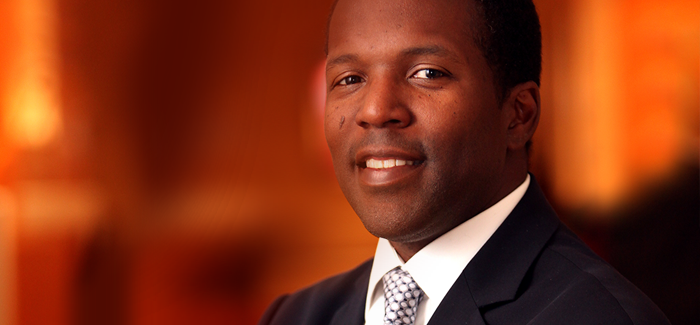
Before joining the University in 2012, Douglas was President Obama’s senior adviser on urban policy. (Photography by Bruce Gilbert)
Vice president for civic engagement Derek R. B. Douglas discusses how the University and the city of Chicago work together.
One morning last fall, about 200 people gathered in a large loft-like space on the second floor of a University-owned building on 53rd Street to take part in the announcement of the Chicago Innovation Exchange.
There were neighbors, local elected officials, city officials, and Mayor Rahm Emanuel. There were corporate executives, well-known entrepreneurs, investors, nonprofit leaders, and noted business scholars. There were materials scientists, medical researchers, and students from the University. There were University officials, Argonne National Laboratory officials, and members of both their governing boards.
It was an impressive cross section of the kinds of people who might benefit from the Chicago Innovation Exchange—a new center to help scholars and entrepreneurs translate their ideas into start-up businesses and products. That enthusiastic crowd also testified to the University’s commitment to bringing together many different parts of our community and catalyzing projects that are greater than any single entity could undertake on its own.
The Office of Civic Engagement was created a little more than five years ago, and I joined the office two years ago. At a basic level, our goal is to provide infrastructure and leadership for the many ways in which the University engages with and has an impact on its neighbors, the city, the region, and the nation. In the process, we hope to create an example of how a great city and a great university can work together to their mutual benefit.
To that end, the University approaches civic engagement from its four main roles: as an anchor, an educator, a researcher, and an innovator. For instance, we leverage our role as an educator to advance educational initiatives that impact the surrounding community and the city. Our work in schools involves educating 1,800 students through the Urban Education Institute’s four charter school campuses; developing rich scholarship and tools for school reform through the Consortium on Chicago School Research and UChicago Impact; advising students, families, and school counselors about the college admissions process through our Offices of College Admissions and Financial Aid; offering enrichment courses to more than 900 middle and high school students through a variety of programs, some of them part of the Office of Civic Engagement; and much more across the institution. Even our students play an important role in our relationship with Chicago schools, providing more than 35,000 volunteer hours last year at more than 50 partner sites.
Some of that work goes on almost invisibly to anybody not directly involved, and it is important work. But one of the more satisfying kinds of civic engagement that the University undertakes is when the initiatives we take on inspire others and catalyze new projects that might not have taken place. That is one of the express goals of the Chicago Innovation Exchange, and already the announcement of the Exchange has prompted new leasing interest on 53rd Street as well as interest in potential partnerships from corporations and organizations around the country.
Another great example of the catalytic power of the University’s civic partnerships can be seen up and down 53rd Street in Hyde Park. In 2008, at the request of the City of Chicago, the University of Chicago purchased the old Harper Court and, as an anchor institution on the South Side of Chicago, agreed to work with the community, leading a public-private partnership that would bring new retail activity and new economic opportunity to the neighborhood. The result, achieved in the face of a global financial crisis that put a halt to projects in Chicago and across the nation, is the new mixed-use Harper Court, which includes a hotel, restaurants, shops, parking, and University offices.
The benefits of Harper Court quickly spread. Popular stores such as the Chicago-based fashion outlet Akira chose to open in Hyde Park because of the promise of a new critical mass of businesses and shoppers. Entrepreneurs such as Hyde Parker Jackie Jackson, the owner of Kilwins chocolate, fudge, and ice cream shop, decided to invest here. Newcomers such as the operator of the Harper Theater and existing concerns such as Chant restaurant report booming business as the entire neighborhood becomes a new kind of destination.
Immediately after the announcement of the Chicago Innovation Exchange last fall, everybody in attendance was invited downstairs to meet another new neighbor of the center, Michelin-rated chef Matthias Merges, who hosted a reception at his brand-new restaurant A10. For Merges, it was a chance to introduce a whole new audience to his work. For the guests, it was a surprise opportunity to top off some good news with samples from one of the hottest chefs around. From a civic engagement standpoint, it was one more example of the unexpected benefits of having a great university deeply involved in the life of a great city.
